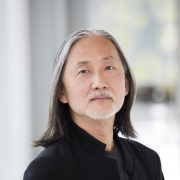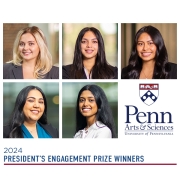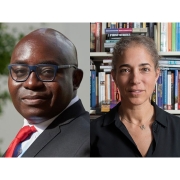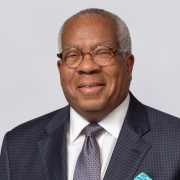Penn Arts & Sciences Names 2020 Dean's Scholars

Penn Arts & Sciences has named 20 students from the College of Arts & Sciences, the College of Liberal & Professional Studies, and the Graduate Division as 2020 Dean’s Scholars. This honor is presented annually to students who exhibit exceptional academic performance and intellectual promise.
COLLEGE OF ARTS & SCIENCES
Fahad Ahmed (Communication) is a senior University Scholar with a major in Communication (concentration in Health Communication) and a minor in Chemistry. As a freshman, Fahad joined Dr. Kalil Abdullah’s research team on the Penn Glioma Outcomes Project, which analyzes the outcomes of patients with brain tumors. Fahad, who has already co-authored a number of peer-reviewed publications, is described by his faculty mentors as a “superstar” with a talent for mentoring other students in the difficult task of interdisciplinary research. At its annual meeting in 2018, the American Association of Neurological Surgeons awarded Fahad first place in socioeconomics for his poster on Quantifying Extent of Resection Thresholds for Increased Survival in Elderly Patients with Glioblastoma.
Omkar Katta (Mathematical Economics) is a senior mathematical economics scholar who stands out among his peers for having completed three quantitative graduate courses, with two more in progress. Professor of Social Policy Femida Handy has worked with Omkar on three research projects, ranging from a comparative analysis of the intergenerational transmission of environmental values to studies of the impacts of gendered and cultural contexts on motivations toward voluntarism. As part of Professor Handy’s research team, Omkar wrote a case study for her latest book on ethical decision-making. She calls him “the best of the best” and praises his “eagerness to learn no matter how daunting the demands might be.”
Srinivas Mandyam (Biophysics, Mathematics, and Physics) is a senior Roy and Diana Vagelos Science Scholar and a Vagelos Challenge Award winner. Srinivas, who is also pursuing a master’s in physics, is a published first author in the American Chemical Society’s journal ACS Nano, and serves as a member of Professor A. T. Charlie Johnson’s research team. Professor Johnson says Srinivas shows “a remarkable level of productivity for a student at this stage” and his work “has drawn the attention of the Intel Advanced Components Group.” Srinivas is passionate about community outreach and teaches a weekly science class at a local public high school. Elected to Phi Beta Kappa as a junior, he has also been honored with a Churchill Scholarship, a Goldwater Scholarship, and a NASA Space Fellowship.
Melisande B. McLaughlin (Cinema and Media Studies) is a senior recognized in her program as “a highly accomplished filmmaker” who explores contemporary social, political, and humanitarian issues through film for the purpose of effecting social change. Professor Peter Decherney, who has worked with Melisande on several virtual reality documentary film projects in Kenya, Puerto Rico, and Ethiopia, describes her as “exceptionally gifted both as a scholar and as an artist.” Professor Decherney adds that Melisande "brings a fierce sense of ethical responsibility to all of her projects, and is always thoughtful about the political context.” Melisande is co-founder of the Penn chapter of FilmAid, a club that supports Philadelphia-area refugees and refugee filmmakers.
Leo J. Sarbanes (Music) is a senior recognized by faculty in the music department as an outstanding scholar and performer. With a minor in Biological Basis of Behavior, Leo’s drive to understand music from multiple perspectives, including neuroscience, has been noteworthy. Professor James Primosch says, “I have never had an undergraduate with such a sophisticated command of theoretical tools and such clear and mature thinking about musical issues.” Leo is a member of the Penn Symphony Orchestra and interned at Opera Philadelphia as part of Penn’s Humanities Internship Program. During his internship, Leo created a curriculum guide for city public school teachers about an annual opera festival and produced a multimedia educational tool for school children.
Adithya Sriram (Biophysics and Physics) is a senior Benjamin Franklin Scholar in the Vagelos Integrated Program in Energy Research (VIPER) joint degree program with Engineering. He has received both a Vagelos Science Challenge Award and a scholarship from the NASA Pennsylvania Space Grant Consortium. Adithya is a skilled researcher who has already made important contributions to the field of nucleic acid detection technology. In Professor A. T. Charlie Johnson’s lab, he worked to develop a unique system for using novel DNA molecules to detect a specific protein implicated in Parkinson’s Disease. Elected to Phi Beta Kappa in his junior year, Adithya works as a teaching assistant and peer tutor, and leads introductory physics labs in underserved West Philadelphia high schools.
Christina M. Steele (Psychology) is a senior Benjamin Franklin Scholar and a Beinecke and Marshall Scholar. Christina examines how relationships at the interpersonal level inform intergroup dynamics in society through the emerging field of relationship science. Her senior thesis focused on how to reduce negative bias toward members of different social groups. Christina has participated in two National Science Foundation Research Experiences for Undergraduates (REU) programs, studying the lasting impacts of violence on soldiers and civilians, and the childhood experiences of Roma citizens in Ukraine. According to the undergraduate chair of Psychology, “Christina is a model citizen who not only cares about making a difference in other people’s lives but takes meaningful action to do so.”
Piotr Wojcik (Urban Studies) is a senior who was part of the inaugural group of Gordon Fellows in Urban Studies at Penn. He interned with The Heidelberg Project in Detroit, gaining high praise, particularly for his graphic design contributions. Piotr used his experience in Detroit to inform his senior seminar research, which explores how public availability of digitized information about vacant land favors developers over residents, resulting in unequal outcomes. Piotr’s thesis director, Dr. Molly McGlone, has been impressed with his “ability to take on this complex topic” and develop it “into a theoretically interesting study of the use of technology by city governments.”
Qingyang (Freya) Zhou (Cinema and Media Studies, Comparative Literature, and German) is a senior described by Professor Peter Decherney as “an academic superstar” with “research skills and writing ability that are already at the level of an advanced graduate student.” Freya, who is fluent in three languages, has traveled to Shanghai, Germany, and Israel as part of her research project, “The Influence of Jewish Refugees on Chinese Communities in Shanghai during World War II.” Her work has been published in the Penn Jewish Studies undergraduate journal Kedma and in the Penn History Review. In March 2019, Freya presented her research at the Northeast Modern Language Association meeting (NeMLA) and was awarded the NeMLA Undergraduate Forum Award for Best Use of the Conference Theme, “Transnational Spaces: Intersections of Cultures, Languages, and People.”
COLLEGE OF LIBERAL & PROFESSIONAL STUDIES – UNDERGRADUATE PROGRAM
Nathan Duane Coonts (Political Science) is an accomplished senior studying political science and history. Nathan has worked with Professor Kathleen Brown on several projects including The Penn & Slavery Project, which researches Penn’s historical connections with the institution of slavery, and on the development of an augmented reality historical campus tour app. He has also lectured in Professor Brown’s gender studies course. Nathan recently presented his research at a Weitzman School of Design conference, “Investigating Mid-Atlantic Plantations: Slavery, Economies, and Space.” He plans to pursue a law degree after graduation. Nathan is a member of Penn’s Student Veterans Association and has been selected to present at this year’s Student Veterans of America National Conference.
PROFESSIONAL MASTER'S PROGRAMS
Hope Elliott (Master of Science in Applied Geosciences) is recognized in her program as an exceptional young scholar and departmental citizen with a focus in environmental chemistry and human health. While in the MSAG program, Hope travelled with a team of five students to West Virginia to research methods of providing clean drinking water to people living in former coal camps. Hope’s capstone research with Professor Reto Gieré focuses on detecting trace metals in artisanal charcoal in Uganda. Her goal is to evaluate the potential for exposure to certain metals when charcoal is burned as a domestic fuel source. Hope has also served as a teaching assistant and is part of a team developing a green infrastructure solution to manage storm water flooding on campus.
GRADUATE DIVISION – DOCTORAL PROGRAMS
Shorouk Badir (Chemistry) is doing seminal work in Professor Gary Molander’s lab that has already helped attract significant funding from the pharmaceutical industry. Shorouk is also an excellent teacher and mentor of undergraduate students. She is the recipient of the Department of Chemistry’s Exceptional TA award and the Excellence in Graduate Chemistry Research award. Professor Molander describes Shorouk as one of his most “productive and creative” students; she already has nine scientific publications, and her contributions to various lab projects are expected to be “hugely impactful” in changing the way that chemists create novel compounds from simple building blocks using readily accessible techniques.
Eilidh Beaton (Philosophy) is a Graduate Associate at Perry World House who has cultivated interdisciplinary knowledge in political philosophy and policy engagement. Her dissertation examines issues of refugee status in international law, the obligations on states to facilitate integration of refugees, and the refugee’s right to family reunification. A journal version of one of her core chapters is forthcoming in Law and Philosophy. Her research is inspired by her on-the-ground work with refugees through Oxfam (UK), Refugee Council (UK), and Philadelphia’s Nationalities Service Center. In 2019, Eilidh was awarded the prestigious Young Scholar Prize by the International Association for the Philosophy of Law and Social Philosophy.
Tanner Kaptanoglu (Physics and Astronomy) has distinguished himself as a talented physicist not only through his contributions to the SNO+ experiment, a multinational collaboration, but as the co-inventor of the dichroicon, the first device capable of sorting photons by wavelength in large-scale neutrino detectors. It is an enabling technology for future experiments and may have uses in medical imaging and solar energy generation. Tanner’s work, which Professor Joshua Klein believes has “all the hallmarks of a senior scientist,” earned him an Honorable Mention for the U.S. Department of Energy's Graduate Instrumentation Research Award. Tanner has also been a dedicated mentor to undergraduate students.
Davy Knittle (English) has been called an intellectual “force” across multiple fields of study ranging from poetics and urban studies to queer theory and trans studies. Davy’s doctoral thesis, “Queer With the City: Deviance and the Politics of Urban Change,” uses experimental poetry to uncover the ways in which post-war urban renewal used a “logic of deviance” to not only marginalize working-class residents and communities of color but also to push sexually “deviant” subjects away from urban spaces. In addition to Davy’s accomplishments as an award-winning poet and published scholar, he is credited as a “vital” and “galvanizing” figure in the Penn community, passionate about activism and volunteerism. He has helped organize a number of literary events for the Kelly’s Writer’s House, taught public writing workshops, and was a key contributor on the Penn Trans Literacy Project.
Mina Khalil (Near Eastern Languages and Civilizations) is recognized in his department as a skilled researcher with a sharply analytical mind, deeply interested in examining the historical roots of modern Egyptian criminal law and the modern Egyptian state. His dissertation focuses on the treatment of criminal defendants within an entrenched Egyptian criminal justice system, a problem which he confronted in his own human rights work as a lawyer in Egypt during the 2011 Arab Spring. Mina’s proficiency in several middle eastern languages has enabled him to translate a vast number of archival sources from the 19th and early 20th centuries to support his research. During his time at Penn, Mina has received an American Research Center Fellowship in Egypt and a Golieb Fellowship in Legal History from New York University Law School.
Ruth Moyer (Criminology) came to Penn after practicing as a criminal defense attorney for six years. She is now a social scientist and criminologist who uses quantitative methods to examine the impact of changes to the urban community on crime. A recipient of an Urban Studies fellowship at Penn, Ruth has studied the effects of opioid treatment centers on county-level crime, as well as how remediating blighted vacant lots correlates with a decrease in shooting incidents. Ruth’s work also examines the effect of high-profile policing incidents on community-police relations. An accomplished writer and instructor, Ruth been widely published and has taught two of the Criminology department’s introductory courses on criminal justice.
Benjamin Oyler (Music) is a philosopher and critical theorist with a background in jazz performance, an area in which he also teaches. Benjamin's research explores transnational circulations of Euro-American musical and literary experimentalism from the 1960s to the present. Actively blurring disciplinary lines of inquiry, he draws on sound studies, critical theory, ethnomusicology, and cultural studies for his research. In particular, he is interested in the relationships between the body, biopolitics, emerging technologies, and ideologies of selfhood and discipline. Associate Professor Jim Sykes calls Benjamin “that rare scholar and teacher who has both a well-articulated set of interests and a voracious mind that is always exploring the outer edges of established topics.”
Claire Conklin Sabel (History and Sociology of Science) stands out among her peers as a dynamic thinker whose research has been called “consequential to some of the most compelling contemporary debates around climate change, energy and resource-use.” Claire studies the relationship between global commerce and the earth sciences in the early modern period, with a focus on the trade in mineral commodities between Europe and Southeast Asia. Claire already has two peer-reviewed publications and has been awarded research fellowships by the Huntington and Folger Libraries. In addition, she is one of the coordinators of the “Science Beyond the West” working group, which aims to shift the history and sociology of science discipline toward a more global perspective through examining areas that have been systematically under-researched.
Aline Zanardini (Mathematics) focuses her current research on the geometry of elliptic fibrations. According to Professor Julia Hartmann, Aline’s achievements in this area have “surpassed what is typical for a student at her stage in our program.” In addition, Aline studies the stability of pencils of plane curves of degree six. This past spring, Aline was invited to present her results at the Mathematical Sciences Research Institute in Berkeley. At Penn, Aline is credited with being a “master TA” and positive role model for women in mathematics; she organized a well-attended reading seminar on Toric Varieties and has been actively involved in departmental events encouraging female undergraduates to apply for graduate mathematics programs.





